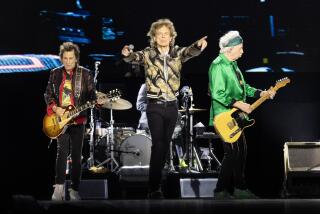GRAHAM REMEMBERED: Jagger and the Stones play...
- Share via
GRAHAM REMEMBERED: Jagger and the Stones play a major role in “Bill Graham Presents: My Life Inside Rock and Out,” the autobiography of the late, colorful concert promoter that is just in stores now.
In fact, it’s a Stones business decision--to have the 1989 “Steel Wheels” tour promoted by the Canadian CPI firm rather than Graham, who had produced several Stones mega-tours--that is cited as a key event in sending Graham into an emotional crisis that haunted him until his death in a helicopter crash nearly a year ago.
Graham, who was 60, confessed to co-author Robert Greenfield that following that rejection he had a nervous breakdown. The man who had escaped Nazi Europe as a child, reinvented himself in America as a young man and engineered some of the music business’ greatest triumphs was shattered by self-doubt.
He was even considering leaving the rock business, perhaps to concentrate on acting and film production--among other small but significant roles, he played mobster Lucky Luciano in “Bugsy” shortly before his death.
“That tour was to be his big farewell to rock, in his mind,” said Greenfield. “But it didn’t happen that way.”
That rejection came after Graham had already suffered through the grueling 1988 Amnesty International global tour and several personal traumas--including an arson fire that destroyed his San Francisco offices. Shaken and bitter, he sought psychiatric help and was prescribed the drug Halcion, and at the time of his death was only beginning to feel back on an even keel.
But it’s that larger-than-life drama that makes Graham’s story so fascinating, and not surprisingly, possible fodder for a movie-- though Greenfield said he doesn’t know what actor would be able to play the complex, intense figure.
The book--told in both Graham’s voice and through anecdotes of more than 100 associates including Keith Richards, Eric Clapton and Jerry Garcia--is filled with stories of confrontations and battles, from his escape from Europe to run-ins with the Hells Angels to legendary feuds with rock managers.
Most famous is his conflict with Led Zeppelin manager Peter Grant, who allegedly had a Graham employee beaten up at an Oakland concert. It’s a picture that supports actor Peter Coyote’s description of Graham: “A cross between Mother Theresa and Al Capone.”
Many such moments were witnessed by Greenfield, who knew Graham since the mid-’60s. “The last story I had of him was in Seattle at a heavy-metal concert, he was 60 years old and jumping into a crowd of 300-pound behemoths, because some guy had yelled at him and he was going to throw the guy out,” Greenfield said. “At things like that I would say, ‘Bill, are you crazy? Are these the actions of a normal human being?’ And there was no answer. It was, ‘This is what I do.’
“For Bill, whatever he was doing at the time was his greatest triumph, the most significant thing he had ever done. But when it was done he started with zero again. . . . He was addicted to the moment.”
More to Read
The biggest entertainment stories
Get our big stories about Hollywood, film, television, music, arts, culture and more right in your inbox as soon as they publish.
You may occasionally receive promotional content from the Los Angeles Times.










